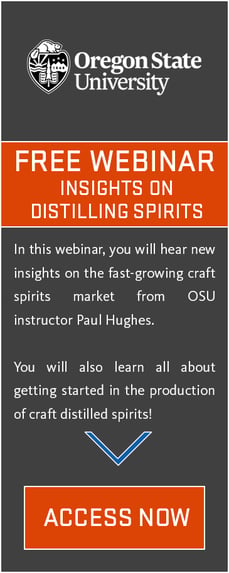Today's consumers aren't really beer-only or whiskey-only enthusiasts. Rather, they are consumers first and foremost, especially of brands they know they like. They might prefer beer one day and cocktails the next, and this leaves an opportunity for breweries looking to expand.
There are some breweries who have taken notice and are now expanding into distilled spirits.
Watch the video or continue reading to find out why breweries should think about expanding into this growing field.
History of Innovation
Let's start with some history on what led to the recent craft beer boom:
- In 1873, there were over 4,100 breweries in the US that produced nearly 9 million barrels of beer.
- In 1983, there were only 80 breweries in the US with six controlling 92% of all US beer production (Anheuser-Busch, Miller, Heileman, Stroh, Coors and Pabst).
- In 2018, there were over 7,400 breweries in the US, with the vast majority of those being craft breweries, brew pubs and microbreweries.
What caused such dramatic growth in the past thirty years?
Deregulation of homebrewing and brewpubs was certainly a factor, but so was consumers' reaction to America's "corporate beer" culture of the time. People wanted new and innovative alternatives, in addition to the big brewers.
The Rise of Brewery/Distilleries
Now, with these changing consumer tastes, innovative breweries are taking the initiative and starting to diversify the distilled spirits industry. Brands like Dogfish Head and Ballast Point have recently added spirits to their product line, and for good reason. In addition to this history and emerging trends, distilled spirits are an easy expansion for brewers.
In a general sense, you could say that whiskey starts off as beer. Both brewers and distillers ferment grains that eventually convert into alcohol. Beer then goes on to be refined with other ingredients like hops, whereas the newly fermented whiskey is never meant to be consumed. (See infographic below that compares brewing, distilling and wine-making).
For breweries, in essence, the add-on of a still is not a massive expense. A complete whiskey plant will cost about 70% of the capital expenditure on the brewing end.
That means breweries have a quick entry into the distilling market.
The Positives of Collaboration
In Colorado, Stranahan’s Whiskey Distillery didn't build a brewhouse, instead, they just did the distilling and brought in the liquid from outside.
Stranahan’s collaborated with Breckenridge Brewery to create “Stranahan’s Well Built™ E.S.B.,” an Extra Special Bitter beer that was aged in Stranahan’s whiskey barrels.
Rogue Brewery in Newport, OR, is another brewery who expanded their line to include spirits. Rouge took the fermented juice from their brewery to the distillery. They currently offer three whiskeys and two gins, in addition to their popular line of beer.
Even the big guys are getting in the mix with Budweiser and Jim Beam partnering for a new brew called Reserve Copper Lager.
Comparison of Brewing, Distilling and Wine-Making
Brewhaus.com put together a helpful breakdown of the difference between brewing, distilling and wine-making.
Distilling Classes
If you would like personalized one-on-one coaching and instruction on how to open your own distillery and avoid common mistakes, you can read more about Oregon State University's Distillery Startup Workshop.
In the expert-led five-day workshop, you will:
- Learn essential information on relevant practical aspects of making a new spirit and finishing the product.
- Interact with practical demonstrations of distillation.
- Address the challenge of adjusting alcohol content to legal requirements.
If you'd like to dive deep into the business side of starting and running a distillery, you can learn more about our new Foundations of Distilled Spirits Business and Essential Training course.
Whether you want to start a distilling business with gin, whiskey/whisky, and anything else, this two-day workshop will help you avoid costly mistakes and shorten the time from idea to execution.
Related Distillery Posts You Might Be Interested In
- How To Start a Craft Distillery.
- How Much Does It Cost to Start a Craft Distillery?
- Why Target Market Research Is So Important for a New Craft Distillery.
- What Are the Legal Requirements For Starting a Distillery?
- 6 Common Distilling Myths and the Facts Behind Them.
- What's the Difference Between Whiskey and Bourbon and Bourbon and Scotch?
- Fast Aging Vs Slow Aging Spirits.
About Paul Hughes, OSU Fermentation Science Instructor
 Paul Hughes, Ph.D., joined Oregon State University to establish a dedicated distilled spirits program. Paul holds a Master of Business Administration with a specialism in innovation and he teaches, trains and consults internationally.
Paul Hughes, Ph.D., joined Oregon State University to establish a dedicated distilled spirits program. Paul holds a Master of Business Administration with a specialism in innovation and he teaches, trains and consults internationally.
He has co-authored two textbooks (one on beer, one on whisky), more than 60 peer-reviewed and conference papers and has been granted four patents.
Paul teaches the five-day Distillery Startup Workshop where attendees can learn practical tools and techniques to successfully begin and maintain their own craft distillery.




